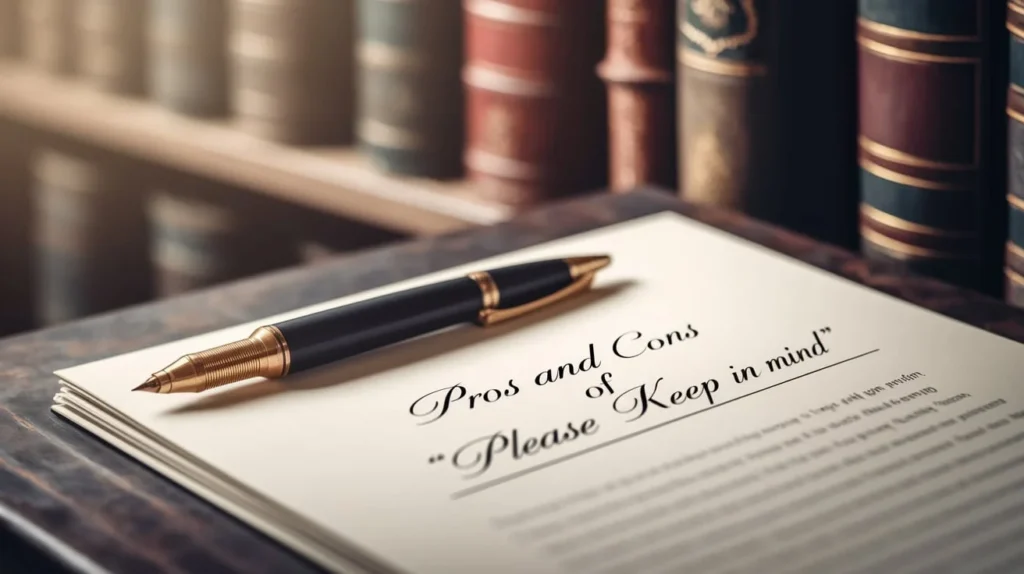Finding the right words can make all the difference when you’re trying to communicate care and thoughtfulness. Whether you’re crafting an email to a colleague or sending a friendly reminder to a friend, finding alternatives to “Please keep in mind” can make your message feel more personal, meaningful, and clear.
In this article, we’ll explore 20 different other ways to say “Please keep in mind,” each with an example, best use case, and a little extra insight to help you express yourself with warmth and clarity.
What Does “Please Keep In Mind” Mean?
“Please keep in mind” is a polite phrase used to gently remind someone of something important. It’s often used in professional and personal settings to make sure that key information doesn’t slip through the cracks. However, using the same phrase repeatedly can make your writing sound a bit robotic. That’s why it’s good to have alternatives that can add variety and nuance to your communication.
In this section, let’s explore alternatives that can help you sound fresh and thoughtful, even when delivering a reminder.
Is It Professional/Polite to Say “Please Keep In Mind”?
Yes, “Please keep in mind” is professional and polite. It’s a neutral phrase that works well in business emails, casual conversations, or even when you’re giving advice. However, depending on the situation, the tone can feel a bit too formal or indirect. For example, if you’re trying to sound more conversational, you might want to opt for something a little more relaxed.
If you’re communicating with close colleagues or friends, it may feel stilted, but it’s still a good choice in formal settings. However, with so many alternatives out there, it’s worth exploring others to see which fits best in the moment!
Pros and Cons of Saying “Please Keep In Mind”

Pros:
- Polite and professional
- Effective for reminders
- Works well in formal contexts
Cons:
- Can sound too formal for casual situations
- Overused in professional settings
- Can be too indirect or impersonal
Synonyms for “Please Keep In Mind”
- Please Remember
- Don’t Forget
- Just a Friendly Reminder
- Keep in Mind
- Just So You Know
- It’s Worth Noting
- Just a Heads Up
- For Your Information (FYI)
- I Wanted to Remind You
- Please Be Aware
- Take Note
- Bear in Mind
- Make Sure to Remember
- Don’t Overlook
- Be Sure to Remember
- Make a Note Of
- Be Mindful
- Just to Remind You
- I Wanted to Mention
- Keep In Mind
1. Please Remember
This is a direct, yet gentle way to nudge someone about something important. It’s simple, clear, and doesn’t overcomplicate the message. You can use this in both professional and casual settings.
Scenario Example:
Hi Sarah,
Please remember that the meeting is scheduled for 10 AM tomorrow. Looking forward to it!
Best,
[Your Name]
Best Use:
When you want to politely remind someone of a specific event or detail.
Additional Note:
This is a great alternative when you need to keep things straightforward, but still friendly.
2. Don’t Forget
Sometimes a little urgency adds weight to a reminder. “Don’t forget” brings a bit of emphasis, without being too harsh. Use this when something is time-sensitive or especially important.
Scenario Example:
Hi Tom,
Don’t forget to submit your report by Friday afternoon. Let me know if you need anything!
Best,
[Your Name]
Best Use:
When you want to emphasize the importance of an action.
Additional Note:
This phrase is casual and can be used with colleagues you’re friendly with. It can be a little too sharp for formal situations, though.
3. Just a Friendly Reminder
A warmer version of a reminder! This phrase softens the nudge and helps convey a tone of friendliness and care.
Scenario Example:
Hi Emily,
Just a friendly reminder that the team’s weekly check-in is at 2 PM today.
Best,
[Your Name]
Best Use:
Perfect for casual work environments or emails to close colleagues.
Additional Note:
If you want to keep things light-hearted and non-pressuring, this is a great choice.
4. Keep in Mind
This one is very close to “Please keep in mind,” but without the formal “please.” It’s still polite but can be used in more relaxed conversations.
Scenario Example:
Hey Jason,
Keep in mind that we’re presenting our proposal at the end of the week.
Best,
[Your Name]
Best Use:
Ideal for a slightly more informal and friendly setting.
Additional Note:
It works well in both work emails and casual conversations, striking a balance between formal and friendly.
5. Just So You Know
Sometimes, it’s important to provide information without sounding too forceful. “Just so you know” is a great way to casually inform someone of something they might need to remember.
Scenario Example:
Hi Claire,
Just so you know, the client requested a few changes to the presentation slides.
Best,
[Your Name]
Best Use:
When sharing information that’s important but not necessarily urgent.
Additional Note:
This one is great for providing updates and keeping people in the loop.
6. It’s Worth Noting
This is a more subtle alternative. It suggests that the information you’re about to share holds value, but without sounding too demanding.
Scenario Example:
Hi John,
It’s worth noting that the budget allocation may change after the next meeting.
Best,
[Your Name]
Best Use:
When you need to provide information that may have future implications but isn’t an immediate concern.
Additional Note:
It’s a softer approach, ideal for sensitive or significant reminders.
7. Just a Heads Up
This is one of the more casual options on the list. It’s perfect for a quick reminder that doesn’t come off too stiff or formal.
Scenario Example:
Hey Kate,
Just a heads up, we may need to reschedule the team lunch.
Best,
[Your Name]
Best Use:
Great for informal settings, especially when the reminder isn’t critical.
Additional Note:
Use it with friends or coworkers you’re comfortable with—it can sound a little too laid-back for formal situations.
8. For Your Information (FYI)
A simple, classic way to provide a reminder without sounding too formal. “FYI” is often used to share helpful or important details, but it can also act as a reminder.
Scenario Example:
Hi Anna,
FYI, the marketing team is meeting at 3 PM today.
Best,
[Your Name]
Best Use:
Perfect for work-related updates and reminders, especiallys.
Additional Note:
It’s widely used in professional communication, but try not to overuse it as it can feel impersonal.
9. I Wanted to Remind You
This phrase is a little more conversational and personal. It conveys that you’re making an effort to help the other person remember something.
Scenario Example:
Hi Paul,
I wanted to remind you that the quarterly report is due at the end of the week.
Best,
[Your Name]
Best Use:
When you want to sound a bit more personal and friendly in a reminder.
Additional Note:
This one works well when you’ve already discussed the topic and just need to gently jog someone’s memory.
10. Please Be Aware
This is a more formal way of getting someone’s attention. It conveys that they should be mindful of something, but it doesn’t feel too demanding.
Scenario Example:
Hi Olivia,
Please be aware that the system will be down for maintenance on Friday morning.
Best,
[Your Name]
Best Use:
Great for formal or business-related reminders, especially when you’re informing someone of a change.
Additional Note:
This one is best used when you want to provide a heads-up without sounding too casual.
11. Take Note
This one can sound a bit more official and is great when you need someone to pay close attention to something.
Scenario Example:
Hi George,
Take note that the office will be closed for the holiday next week.
Best,
[Your Name]
Best Use:
When you need the person to pay particular attention to a detail or change.
Additional Note:
Use this when you want to emphasize that the information is important and shouldn’t be overlooked.
12. Bear in Mind
“Bear in mind” is another polite, yet slightly more formal alternative. It’s a great way to remind someone without sounding too repetitive.
Scenario Example:
Hi Lucy,
Bear in mind that the meeting has been moved to 2 PM instead of 3 PM.
Best,
[Your Name]
Best Use:
When you want to gently remind someone of a detail they need to remember.
Additional Note:
This can sound more formal, but still works well for everyday reminders.
13. Make Sure to Remember
This one emphasizes the importance of remembering something, but it still sounds friendly.
Scenario Example:
Hi Jack,
Make sure to remember that we need the final draft by Wednesday.
Best,
[Your Name]
Best Use:
When you want to stress the importance of remembering something without sounding harsh.
Additional Note:
It’s a good choice when you want to encourage responsibility in a positive way.
14. Don’t Overlook
“Don’t overlook” is a way to remind someone of something they may have missed or forgotten.
Scenario Example:
Hi Lisa,
Don’t overlook the need for a signature on the document before submission.
Best,
[Your Name]
Best Use:
When you want to ensure someone doesn’t miss something important.
Additional Note:
Use this when you’re worried that the detail might be forgotten or ignored.
15. Be Sure to Remember
This alternative is a bit more casual than others, but still effective for reminding someone of something.
Scenario Example:
Hi Rob,
Be sure to remember that the client is visiting tomorrow.
Best,
[Your Name]
Best Use:
When you want to gently remind someone without sounding too serious.
Additional Note:
This is best for informal or semi-formal settings.
16. Make a Note Of
This one is a bit more neutral but still effective for reminding someone to pay attention to a detail.
Scenario Example:
Hi Tara,
Make a note of the upcoming deadlines for the project.
Best,
[Your Name]
Best Use:
When you want to ensure someone is aware of something, especially over time.
Additional Note:
It’s a helpful reminder when something might get lost in the shuffle of a busy schedule.
17. Be Mindful
This alternative is a little more thoughtful and can encourage someone to reflect on something important.
Scenario Example:
Hi Maya,
Be mindful of the time difference when scheduling the call.
Best,
[Your Name]
Best Use:
When you want to encourage awareness in a considerate way.
Additional Note:
Use this when you want to promote mindfulness and attentiveness.
18. Just to Remind You
A casual reminder that’s both polite and to the point. It’s not too formal, and it doesn’t feel forced.
Scenario Example:
Hi Aaron,
Just to remind you, the project’s due date is approaching.
Best,
[Your Name]
Best Use:
When you want to keep it light and non-urgent.
Additional Note:
It works well in almost any setting, depending on your relationship with the recipient.
19. I Wanted to Mention
A conversational way to remind someone of something without sounding too rigid or bossy.
Scenario Example:
Hi Rachel,
I wanted to mention that the new software update is available for download.
Best,
[Your Name]
Best Use:
When you want to share information without sounding like you’re issuing a command.
Additional Note:
It works well when you’re trying to sound friendly and casual.
20. Keep In Mind
A flexible and versatile alternative, this phrase is similar to “Please keep in mind” but often feels a bit more natural.
Scenario Example:
Hi Max,
Keep in mind that the server may experience some downtime over the weekend.
Best,
[Your Name]
Best Use:
This phrase works well in most contexts, both formal and casual.
Additional Note:
It’s a great middle-ground choice when you need to sound considerate but not overly formal.
Conclusion
As you can see, there are plenty of ways to say “Please keep in mind,” each offering a different tone, level of formality, and nuance. Whether you’re reminding someone of an important deadline, offering a gentle nudge, or just sharing helpful information, these alternatives help make your communication feel more personal, thoughtful, and approachable.
Try them out in your next message or email to express yourself in a way that resonates with your audience.















